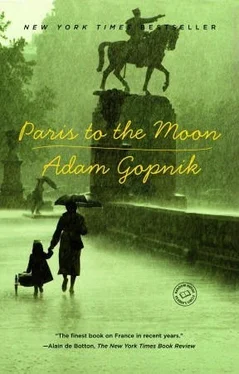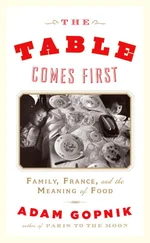I, for instance, had become absolutely furious about the long hallway in our apartment, which ran all the way from the kitchen, where I cooked, way in the back, to the dining room up in front, a constant jostling corridor of plates, forgotten Evian water, and spilled spices, like a trade route in the Byzantine Empire. Back and forth we went, again and again, breakfast, lunch, and dinner. (Kitchens in Parisian apartments are always off at the back, at the end of a long corridor, since there were originally no kitchens, or else because they were for servants, who were expected to be Out There in Back.) I didn’t exactly blame Martha for the length of time it took to get dinner to the table, cold, but I didn’t exactly forgive her for it either.
Martha’s exasperation, for which she didn’t exactly blame me, but which she thought I might have done something about if I were a more efficient person than I am, was the absence of a decent copy shop. She looked after the bills and the dry cleaning and the rent—all the small logistics of life—and she couldn’t find places where you could just go in, hand in a manuscript, and have them copy and collate it, one, two, three, just like that. They had instead machines where you had to feed in two-franc pieces, page by page. (The government discourages video rental stores in Paris, in order to protect the little repertory cinemas whose business, its quite true, would otherwise be destroyed. I don’t know who’s being protected by the discouragement of Kinko-style copy shops; the remaining scriveners and clerks and copyists, I suppose.) The absence of napkins drove her crazy, too. She loved order and cleanliness, and the refusal of a French take-out shop to give more than one napkin per sandwich made her wild. “They hoard napkins,” she would complain. “It’s as though it’s still wartime.” New York, America, where paper napkins shower down like confetti on New Year’s Eve, had become, in her memory, napkin heaven, napkin world.
One day, when I was working in my little office on the latest subject that the office at home had sent in, Martha came storming into my office.
“What’s this?” she said, angry as I had ever seen her, waving a sheaf of envelopes and paper with a blue and gold crest on it.
“What’s what?” I asked, though I knew, or thought I knew.
“These bills,” she said, waving white paper with a blue and gold crest on it. “What is this all/or?” she cried.
“Hot chocolate,” I said weakly.
“Hot chocolate,” she repeated scornfully.
“And cake,” I added.
“Do you know how much this costs?” she said.
“Of course I know. But what can I do? It’s Cressida.”
“Say no.” She looked at me darkly. “That’s a lot of hot chocolate,” she added suspiciously.
“It’s Ada too,” I explained. “She has a habit.”
She walked away. I wondered if she really thought I might be having an affair at the Ritz and if, in some secret way, she wished I were.
Three weeks, and then four went by, and I depended on the children’s happiness to support, to float my own. Luke and I, in the vestiaire, would always have the same two conversations or variations on them. First we would have a sharp, pointed exchange about the nature of buoyancy. What makes people float in water? Well, people are lighter than water, I explained. If you were made of water yourself or well, metal, or something, you would sink. He thought this sounded weird, and I thought so too, actually. People certainly don’t seem lighter than water. They seem just the opposite. People seem heavy as can be compared with water. People are obviously heavier than water; just touch them and then touch water. I knew it was the right answer, but it seemed as unconvincing to me as it did to him. Then we would discuss the conventions of nudity. Why was it OK to be nude in the vestiaire but not in the pool or around the pool? It was a matter of custom and convention, I explained, or tried to. The metaphysics of modesty was even harder to explain than the physics of floating.
I joked with him about the little girls. The sublime Ada and the glorious Cressida, I called them, and those became their names. “What means sublime ?’ he demanded, and I gave some more examples of things, besides Ada, that were scary but irresistible (though I will say right here that I have never met anyone quite as sublime as Ada).
(What does make things float, by the way? That they are lighter than the thing they float in sounds fine when you say it—I know it is the right answer—but it is not a convincing answer because things, however much lighter they may be than the thing they float in, are still so heavy, too heavy to keep up.)
Finally, after about four weeks of joy, Luke had to miss a Wednesday session, I forget precisely why: His class was going on a trip to a goat farm to see how chevre is made or off to an apple farm to help press cider. They were always doing things like that. Anyway, I went to the Ritz myself, as always, feeling the eyes of al Fayed on me, in the person of the sunglassed security men who hid discreetly at the entrance. I got into my swimming suit, my body tensed for the contest to get Luke’s suit on and get him pointed in the right direction, down toward the pool, and I was a little disconcerted when I found I didn’t have to do it.
The girls were already in the pool.
“Where’s Luca?” Cressida cried when she saw me. “Where’s Luca?” She always called him Luca, in the Italian manner, and said it with that funny trans-European intonation, the accent oddly placed on the first syllable: “Where’s Loo-ka?,” just like Audrey Hepburn saying, “Take the pic-ture,” in Funny Face.
He couldn’t come, I explained; his school was doing something that day.
“I’m so sad,” she said, and made a face. “I’m so very sad. I wanted to swim with Luca.” And she swam away, inconsolable. I swam a little myself, and then I slipped away before I could buy hot chocolate for the rich little girls, half expecting to be expelled from the Ritz, a child masher, buying hot chocolate only to serve his son’s romance.
I enjoyed having the Ritz to myself, for once, though, before we had to leave it. I went down to the hammam— that’s what the French call a steam bath—and read the instructions. There were nearly as many prohibitions as those posted on the gates to the public park, although these were more varied. Translated, they read:
1. The shower is obligatory before using the installations.
2. It is forbidden to shave in the sauna.
3. Reading of newspapers is strongly discouraged in the hammam and sauna.
4. Children of less than twelve years are not authorized to use the installations.
“Obligatory,” “forbidden,” “strongly discouraged,” and “not authorized”: four ways of saying “not allowed,” each slightly different, each implying slightly different penalties. Such elegant variations on the theme of No! And these intended for the rich too. You can’t do that here, the French taste for order reaching even into the rich man’s locker room. Who would want to read a newspaper in the steam bath? The ink would get all over your hand. It was like the warnings on the park gates. Who aside from a French functionary would think so encyclopedically about all the things you can’t do in a park? But then only if you can’t, do you want to. If you can, you don’t.
When I got home, I sought Luke out right away. “Hey, you’ve made quite a score with Cressida,” I said. “She was just broken up because you weren’t there today.” “What did she say?” he asked.
“She said, ‘Where’s Luca? I miss Luca, I wish Luca were here to swim.’ Like that. Nothing would cheer her up.” He seemed to take it only half in.
Читать дальше












